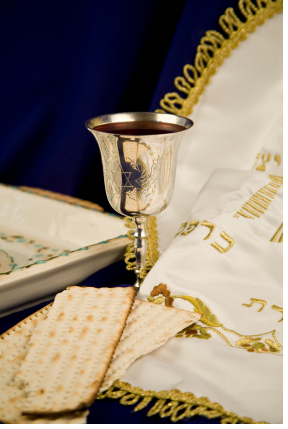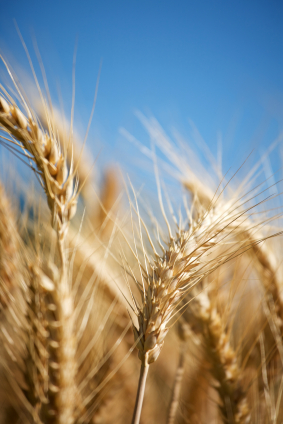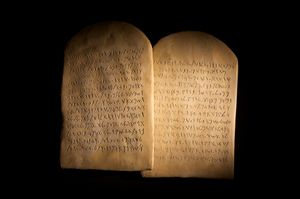-
Here Am I 3:270:00/3:27
THE FEASTS/ MOEDIM
PURIM/LOTS
 Purim (Lots) is a celebration of the deliverance of the Persian Jews over one of the most evil schemes in history to exterminate the Jewish people. The Book of Esther, referred to as a monument in the history of anti Semitism, tells the story of how the beautiful Jewish woman Esther (Hadassah) and her cousin Mordechai prevent the evil Haman from his plan to massacre the Jewish people.
Purim (Lots) is a celebration of the deliverance of the Persian Jews over one of the most evil schemes in history to exterminate the Jewish people. The Book of Esther, referred to as a monument in the history of anti Semitism, tells the story of how the beautiful Jewish woman Esther (Hadassah) and her cousin Mordechai prevent the evil Haman from his plan to massacre the Jewish people.Purim today is celebrated with feasts, sending gifts of food to the needy and with reading The Book of Esther. The earliest depiction of Purim, from the Second Temple offer no suggestion of the partying that is associated with the festival today. The customs of donning masks, drinking and costumes originated in the late fifteenth century Italy.
This holiday is a special one for children, as the story of Esther is told, groggers (noisemakers) are used to depict joy or booing.
Hamantashen, a jammed filled cookie resembling Haman’s hat is served along with other sweet delights.
Purim Date: 14 Adar
PESACH/PASSOVER
 Pesach (Passover) is the High Holy Day commemorating the Exodus of the children of Israel from Egypt. It is an eight day holiday marked by the eating of matzoh. The name Pesach is derived from the time when God passed through the land and killed every firstborn Egyptian but made sure to pass over the houses which had the Blood of the Lamb on the doorpost. As in today, Yeshua is the Lamb and we are sanctified by His Blood. The law of sin and death will pass over us as we call on His name.
Pesach (Passover) is the High Holy Day commemorating the Exodus of the children of Israel from Egypt. It is an eight day holiday marked by the eating of matzoh. The name Pesach is derived from the time when God passed through the land and killed every firstborn Egyptian but made sure to pass over the houses which had the Blood of the Lamb on the doorpost. As in today, Yeshua is the Lamb and we are sanctified by His Blood. The law of sin and death will pass over us as we call on His name.Exodus 12:1-18, Leviticus 23:4-8, Matthew 26:17-30, Luke 22:7-20 (Feast Date: 14 Nissan)
Matzoh/Feast of Unleavened Bread: This begins the day after Pesach and lasts for seven days. During this time the LORD commands that we eat no leaven and have no leaven in our house. Leaven is likened unto sin, and at this time, we reflect on ourselves and the sin that is in our lives.
Exodus 12:18,19, Deuteronomy 16:1-8, 1Corinthians 5:6-8 (Feast Date: 15 Nissan - 22 Nissan)
YOM HABIKKURIM/FEAST OF FIRSTFRUITS
 Yom HaBikkurim (Feast of Firstfruits) begins a 50 day period known as the Counting of the Omer, Sefirat HaOmer. This time is The Feast of Weeks during which Psalms 119 is read as we write the Torah on our hearts and souls. Firstfruits speaks of resurrection. When the Pharisees questioned Yeshua for a sign He rebuked them and said that the only sign would be three days and three nights as Jonah was. Death did not hold our Messiah! On this day Yom HaBikkurim, Yeshua was resurrected from the dead, as He truly is the Firstfruits. The sheaf of Firstfruits is distinctive of The Messiah who has risen from the dead as the firstfruits of those that slept; 1Corinithians 15:20.
Yom HaBikkurim (Feast of Firstfruits) begins a 50 day period known as the Counting of the Omer, Sefirat HaOmer. This time is The Feast of Weeks during which Psalms 119 is read as we write the Torah on our hearts and souls. Firstfruits speaks of resurrection. When the Pharisees questioned Yeshua for a sign He rebuked them and said that the only sign would be three days and three nights as Jonah was. Death did not hold our Messiah! On this day Yom HaBikkurim, Yeshua was resurrected from the dead, as He truly is the Firstfruits. The sheaf of Firstfruits is distinctive of The Messiah who has risen from the dead as the firstfruits of those that slept; 1Corinithians 15:20.During Sefirat HaOmer and the reading of Psalms 119 is a time of self-refinement and self-reflection. Are we walking as the Lord would truly want us? Are we progressing each day towards the Kedoshim of YHWH? Psalms 119 is filled with honor for the Torah and God, and is a great example to us. May you be blessed as you read Psalms 119 during The Counting of the Omer.
THE COUNTING OF THE OMER

SHAVUOT/PENTECOST
 Shavout (Pentecost) commemorates the giving of the Torah at Mount Sinai and the giving of the Holy Spriit in the Upper Room. This Feast Day reflects the ingathering of wheat during the early summer harvest.
Shavout (Pentecost) commemorates the giving of the Torah at Mount Sinai and the giving of the Holy Spriit in the Upper Room. This Feast Day reflects the ingathering of wheat during the early summer harvest.Yocannan the Immerser speaks about this time in Matthew 3:11-12. Repentance is returning to God's Teaching and Instruction - The Torah - and walking as Yeshua walked - by His Spirit! (Leviticus 23:15-22, Exodus 35:22, Deuteronomy 16:9-12, Acts 2:1-31)
The Ten Words were given to Moses on Mount Sinai at Shavuot. The holiday is also called "Zman Matan Toratenu," or "The Time of the Giving of Our Law." Shavout means "The Festival of Weeks," and occurs 7 weeks after Passover.
This is the same day, yet thousands of years later, that Moses was given the Ten Words (Commandments) and the Apostles received the Holy Spirit.
This feast takes places 50 days after Yom Omer
On Shavuot, we celebrate Matan Torah, the Giving of the Torah. Shavuot is one of the Shelosh Regalim (the three Pilgrimage Festivals), equal in importance to Passover and Sukkot. Shavuot has both historical and agricultural significance. Main themes of the holiday are Torah (and the story of Ruth) and agriculture. “Shavuot” is the Hebrew word for “weeks.” Seven weeks after the Hebrew slaves left Egypt, seven weeks after Passover, the Israelites were giving the Ten Commandments, entering into Covenant when they received the Torah at Mt. Sinai. This is also remarkably the exact day when in Acts 2 the people received the Holy Spirit ~ The Spirit of God that of which would never lead His people away from Torah and His Word.
Tradtions are:
1. Read the Book of Ruth.
a. The Book of Ruth describes the harvest season and Shavuot is also known as Hag HaKatsir, the Harvest Festival. On Shavuot, when we celebrate God’s giving and the acceptance of the Torah, we read of Ruth’s willingly entering into the Covenant of God and His Ways. The end of the Book of Ruth describes the lineage of King David, who is Ruth’s great-grandson. According to tradition, King David was born and died on Shavuot. This is also the lineage of our Messiah, Yeshua HaMashiach!
2. Study the Ten Commandments. The Ten Commandments are traditionally read from the Torah at Shavuot services.
3. Make (and eat!) dairy foods. It’s customary to eat dairy foods! Some say that this is because the Bible compares Torah to “honey and milk…under your tongue” (Song of Songs 4:11).
4. Bake a special challah.
5. Decorate the home and synagogue with plants and flowers.
6. Be outdoors with your family as you marvel in His glorious Ways!
YOM TERUAH/FEAST OF TRUMPETS
 Yom Teruah (The Feast of Trumpets) celebrates the return of Jesus Christ to earth to establish the Kingdom of God! In the book of Revelation we read about events that describe angels sounding a series of seven trumpet blasts. The seventh angel's sounding of the last trumpet signifies that "the kingdoms of this world have become the kingdoms of our Lord and of His Christ" (Revelation 11:15).
Yom Teruah (The Feast of Trumpets) celebrates the return of Jesus Christ to earth to establish the Kingdom of God! In the book of Revelation we read about events that describe angels sounding a series of seven trumpet blasts. The seventh angel's sounding of the last trumpet signifies that "the kingdoms of this world have become the kingdoms of our Lord and of His Christ" (Revelation 11:15).Leviticus 23 calls the blowing of trumpets a memorial and many believe it is a memorial of God’s grace to Abraham (Genesis 22). Yom Teruah is signaled in by the blowing of the Shofar (Leviticus 23:24, 1Chronicles 15:24 and Psalms 81:3). Yom Teruah begins the 10 Days of Awe bringing us into Yom Kippur.
The Feast of Trumpets also marks the future fulfillment of the many Old Testament prophecies that speak of a Messiah coming as a king who will rule with power and authority. The concept of a conquering Messiah was on the minds of the apostles immediately after Jesus' resurrection. When He appeared to them in those early days, they asked questions such as: "Lord, will You at this time restore the kingdom to Israel?" (Acts 1:6).
Feast Date: 1 Tishrei
YOM KIPPUR/DAY OF ATONEMENT
 Yom Kippur (The Day of Atonement), the holiest day of the year, is a day of fasting, prayer and making teshuva (repentance) as we prepare ourselves for the coming of The Lord. We forgive and we seek forgiveness as we enter into a deeper relationship with our King, Yeshua. This is the wedding phase of our Bridegroom, Yeshua.
Yom Kippur (The Day of Atonement), the holiest day of the year, is a day of fasting, prayer and making teshuva (repentance) as we prepare ourselves for the coming of The Lord. We forgive and we seek forgiveness as we enter into a deeper relationship with our King, Yeshua. This is the wedding phase of our Bridegroom, Yeshua.Then as the prophets had foretold, God sent His Son, Yeshua the Messiah to be the final offering for sin. When Yeshua died on the tree, His death provided an atonement once and for all. Therefore, believers in Yeshua can rejoice on Yom Kippur that we have assurance of forgiveness of sin.
The Day of Atonement has many special customs, including: Fasting, Kol Nidre (the eve of Yom Kippur), Yizkor, a special prayer at noon, and the blowing of the shofar.
Leviticus 16:31, 23:27-32
Yom Kippur Date: 10 Tishrei
